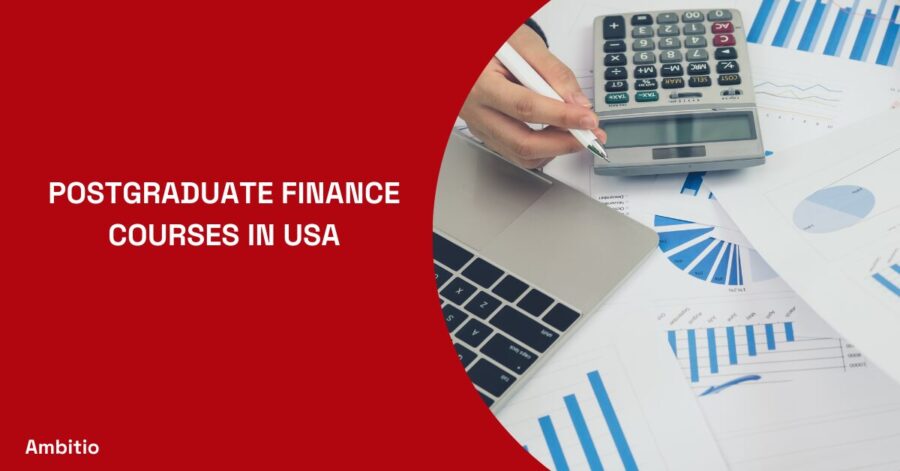13 December 2024
6 minutes read
Navigating the Future: Postgraduate Finance Courses in the USA for 2024

Introduction
As we look towards the horizon of 2024, the landscape of postgraduate education in finance within the United States presents a compelling opportunity for graduates seeking to refine their expertise.
Renowned for its innovative teaching methods, state-of-the-art facilities, and a focus on real-world applications, the USA offers a broad spectrum of finance courses designed to shape the next generation of finance leaders.
Why the USA for Postgraduate Finance Education?
The decision to pursue postgraduate studies in finance in the USA is a strategic step toward significant career advancement. American universities are globally recognized for their rigorous academic standards, cutting-edge research, and their contributions to the finance industry. This educational excellence is why so many choose to embark on this transformative journey in the States.
Comprehensive Coursework and Specializations
Postgraduate finance courses in the USA are characterized by their comprehensive approach to teaching the intricacies of finance. Students can expect to delve deep into subjects such as quantitative finance, financial theory, and the applications of financial technology.
Master of Science in Finance: A Deep Dive
Master of Science in Finance programs offer a deep dive into the technical aspects of finance, including analytics and quantitative methods. Students can choose to specialize in areas such as risk management or fintech, benefiting from hands-on training in state-of-the-art labs and through real-time trading simulations.
The MBA in Finance: Bridging Theory and Practice
For those looking to combine comprehensive business management skills with financial expertise, the MBA in Finance is the ideal choice. These programs often include case studies, internships, and other experiential learning opportunities that bridge theory and practice, preparing students for leadership roles in finance.
Global Recognition and Career Prospects
Graduates from USA postgraduate finance programs are highly sought after due to the global recognition of their degrees. This opens doors to international career opportunities in various sectors such as investment banking, asset management, and corporate finance.
Unlocking Doors in International Finance
A degree from a prestigious U.S. institution acts as a key to unlocking doors in international finance. Recruiters and corporations worldwide acknowledge the caliber of U.S. postgraduate finance programs, often putting graduates on a fast track to upper management and executive positions.
The Competitive Edge in the Job Market
With a U.S. postgraduate finance degree, graduates have a competitive edge in the job market. The comprehensive curriculum, coupled with exposure to the latest financial tools and technologies, ensures that students are well-prepared to tackle the challenges of modern finance roles.
Scholarships and Financial Aid: Lowering the Financial Barrier
Understanding the financial burden of postgraduate studies, U.S. universities and various organizations offer scholarships and financial aid to support deserving students. These financial aids significantly lower the barriers to entry and open up postgraduate education to a more diverse student body.
Types of Scholarships Available
From merit-based scholarships to need-based grants, there are numerous types of financial support available. Some are offered by universities themselves, while others are provided by private foundations, alumni groups, and public institutions.
The Process of Securing Financial Aid
Securing financial aid requires diligent research and timely application. Prospective students should prepare to showcase their academic achievements, leadership qualities, and financial needs through detailed applications and often, interviews.
The Eligibility Criteria for Admission
Admission into postgraduate finance courses in the U.S. is competitive and requires meeting certain eligibility criteria. These typically include academic qualifications, standardized test scores, and language proficiency, among others.
Academic Qualifications and Test Scores
Prospective students must often hold an undergraduate degree in a relevant field and present competitive GMAT or GRE scores. These scores reflect one’s analytical and quantitative capabilities, critical for success in finance.
Language Proficiency and Work Experience
For international students, proof of English language proficiency through TOEFL or IELTS scores is imperative. Additionally, some programs may require or favor applicants with relevant work experience, highlighting their practical understanding of financial concepts.
The Cost of Living and Studying in the USA
Studying in the USA comes with its financial considerations. The cost of living can vary greatly depending on the location, and tuition fees can be significant. However, the return on investment for a postgraduate finance degree in the U.S. is often well worth the initial cost.
Budgeting for Tuition and Living Expenses
Prospective students must budget for tuition and associated academic fees, as well as living expenses such as housing, food, and transportation. This budgeting is crucial for financial planning and ensuring a stable educational journey.
Financial Management for International Students
International students must also consider visa costs, health insurance, and potential travel expenses. Effective financial management and planning are essential to navigating these additional costs without detracting from the educational experience.
The Application Process: A Step-by-Step Guide
Embarking on a postgraduate finance course in the United States is an exciting but complex journey. The application process is multifaceted and requires careful attention to detail. Here is a comprehensive guide to help you navigate the application steps for enrollment in 2024.
Preparing Your Application
The first step in your application process is to gather all the necessary components. A complete application typically includes the following:
- Academic Transcripts: Gather official transcripts from all undergraduate and, if applicable, graduate institutions you have attended. These documents serve as a testament to your academic history and performance.
- Standardized Test Scores: Prepare and register for the required standardized tests well in advance. The Graduate Management Admission Test (GMAT) or the Graduate Record Examination (GRE) scores are mandatory for most finance postgraduate courses. Ensure you understand the score requirements of your targeted programs.
- English Language Proficiency: If you are an international student, you will need to take the TOEFL or IELTS to demonstrate your proficiency in English. Some universities may accept other tests or waivers if you have completed a degree in an English-speaking country.
- Personal Statement: Write a compelling personal statement that reflects your passion for finance, your career objectives, and why you are interested in the particular program. This document should highlight your unique qualities and how they align with the program’s offerings.
- Letters of Recommendation: Select recommenders who can attest to your academic abilities, professional achievements, and personal character. Typically, you will need two to three letters from former professors, employers, or professional mentors.
- Resume/CV: Update your resume or CV to include all relevant work experience, internships, academic achievements, and any other activities or honors that showcase your suitability for the program.
- Application Forms: Fill out the application forms with accurate and current information. These forms will capture your basic personal details, academic background, and sometimes your professional experiences and goals.
- Interview Preparation: Some programs may require an interview as part of the application process. Treat this as a professional job interview. Practice your responses to common questions and be prepared to discuss your application and aspirations.
- Application Fee: Be prepared to pay an application fee. If this is a financial burden, some schools offer waivers, so it’s worth checking if you qualify.
Navigating the Admission Timeline
Each university will have its own admissions timeline, but most follow a similar pattern:
- Research and Shortlisting: Begin researching potential programs at least a year before you plan to start. Shortlist the ones that align with your career goals and meet your academic profile.
- Testing: Schedule your GMAT, GRE, TOEFL, or IELTS exams early enough to allow time for a retake if necessary. Remember that it can take a few weeks for your official scores to be reported to schools.
- Early Preparation: Start preparing your application components months in advance. Draft your personal statement, update your resume, and approach potential recommenders early to give them enough time to write a thorough recommendation.
- Application Rounds: Understand that there are often several rounds of application deadlines. Early application rounds may increase your chances of acceptance and scholarships, but ensure that you do not sacrifice the quality of your application to meet an early deadline.
- Submission: Aim to submit your application ahead of the deadline to avoid any last-minute technical difficulties that could delay your submission.
- Follow-Up: After submission, you may need to send additional information or documents if requested by the university. Keep an eye on your email and the application portal for any communications.
- Interviews: If selected for an interview, schedule it as soon as possible. Use this opportunity to reinforce your interest in the program and to make a personal connection with the admissions committee.
- Decision and Acceptance: Admissions decisions can take several weeks or months. Once you receive an offer, you will typically have a set period to accept or decline. Review any financial aid offers and understand the conditions and benefits before making your decision.
- Visa Application: International students should begin the visa application process immediately after acceptance to ensure all paperwork is in order for the move to the U.S.
- Preparation for Relocation: Start planning for housing, setting up a bank account, health insurance, and other logistics well in advance of your move to the U.S.
Conclusion
Embarking on a postgraduate finance course in the USA is not just an educational commitment; it is a step into the world of advanced finance. With the right preparation, meeting eligibility criteria, and securing financial aid, the dream of pursuing a finance degree in the USA can transform into a tangible and rewarding reality.
As these courses continue to evolve, they remain at the forefront of providing top-notch education to the finance professionals of tomorrow, ready to make an impact on the global stage.
FAQs
Can I work in the USA after completing a postgraduate finance course?
Yes, there are visa options that allow graduates to work in the USA for a certain period after completing their studies. This is subject to change, so it’s best to consult with the university’s career services or an immigration attorney.
How do I know which finance course is right for me?
Consider your career goals, the curriculum offered, the faculty’s expertise, and the university’s industry connections. It’s also wise to reach out to alumni for their insights.
What is the typical duration of postgraduate finance courses in the USA?
Most postgraduate finance courses, such as the Master in Finance or MBA with a finance concentration, can be completed in one to two years of full-time study.
How competitive is admission into these programs?
Admission is highly competitive. It’s important to maintain a strong academic record, score well on required tests, and prepare a compelling application to enhance your chances of acceptance.
Is it necessary to have a background in finance to apply for these programs?
While it is beneficial, many programs accept students from diverse academic backgrounds, provided they demonstrate strong quantitative and analytical skills.

You can study at top universities worldwide!
Get expert tips and tricks to get into top universities with a free expert session.
Book Your Free 30-Minute Session Now! Book a call now




























